Updated as of July 20
On June 28, Secretary of State John Kerry began a final round of nuclear talks in Vienna with foreign ministers from Iran and the world's six major powers. The following is a rundown of the negotiations as officials pushed towards a final deal.
- Secretary of State John Kerry held a series of meetings in Vienna with Iranian Foreign Minister Mohammad Javad Zarif, E.U. foreign policy chief Federica Mogherini, and the foreign ministers of Britain, France, and Germany.
- Kerry was accompanied by Energy Secretary Ernest Moniz, Under Secretary for Political Affairs Wendy Sherman, and several other high-ranking officials.
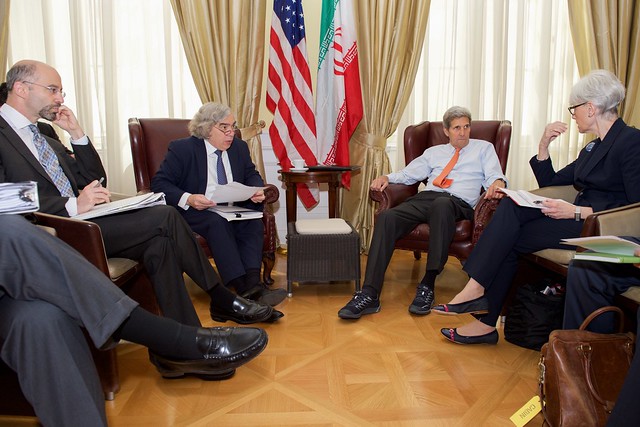
- Zarif told reporters, "We have come to Vienna to reach an agreement which fully respects the Iranian nation's interests and rights and will be a good agreement for the entire world.” Zarif returned to Tehran at the end of the day, reportedly to consult with other officials about the talks.
- Mogherini noted that “the political will is there. I've seen it from all sides. So we have tasked our negotiating teams to start working immediately tonight on the text [of the final deal].” Mogherini also hinted at a short extension past the June 30 deadline. “If we need to have a couple of additional days more, it's not the end of the world,” she said. “But it is very clear that the deadline is going to stay end of June / beginning of July.” She also emphasized that “We don't have new points open on the agenda. We are not renegotiating things.”
- Talks continued at the ministerial level in Vienna.
- Kerry also met with International Atomic Energy Agency (IAEA) director Yukiya Amano.
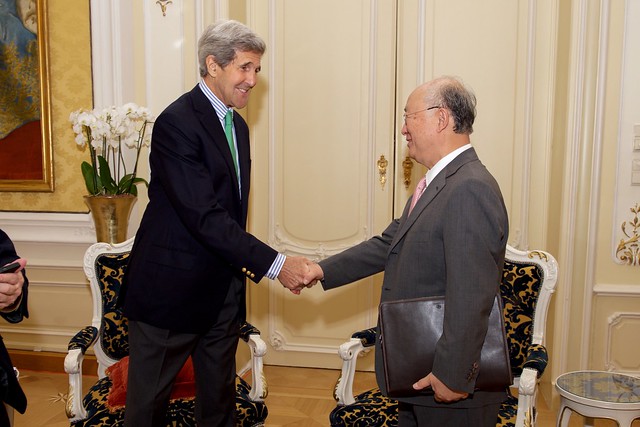
- White House Press Secretary Josh Earnest said, “If the Iranians refuse to agree to a final agreement that is consistent with the framework that was reached in April, then there won’t be an agreement.” An unnamed U.S. official made a similar comment, warning “this path forward has to be based on the Lausanne parameters. Period.”
- In Tehran, the head of Iran’s Atomic Energy Organization, Ali Akbar Salehi said, "We have repeatedly said that Iran's peaceful nuclear program is for technological purposes.” He added, “The Islamic Republic of Iran has set its own boundaries for nuclear talks, which lets no opportunity cross the redlines.” Salehi, who had been recovering from surgery, joined negotiators in Vienna the next day.
- Zarif returned to Vienna, accompanied by Salehi and Hossein Fereydoun, President Hassan Rouhani’s brother and special advisor. Upon his arrival, Zarif said the talks were at a “critical stage” but that negotiations were “making progress.”
- State Department spokesperson Marie Harf announced that the terms of the interim agreement would be extended so the talks could continue past the deadline. "The P5+1 and Iran have decided to extend the measures under the Joint Plan of Action until July 7 to allow more time for negotiations to reach a long-term solution…on the Iran nuclear issue,” she said.
- The U.S. Treasury issued guidance on extending limited sanctions relief until the new deadline.
- Salehi and Moniz met to discuss the technical aspects of a deal.
- Russian Foreign Minister Sergei Lavrov and German Foreign Minister Frank-Walter Steinmeier arrived in Vienna. Lavrov met separately with Zarif, Kerry, and Steinmeier.
- Zarif met with Amano.
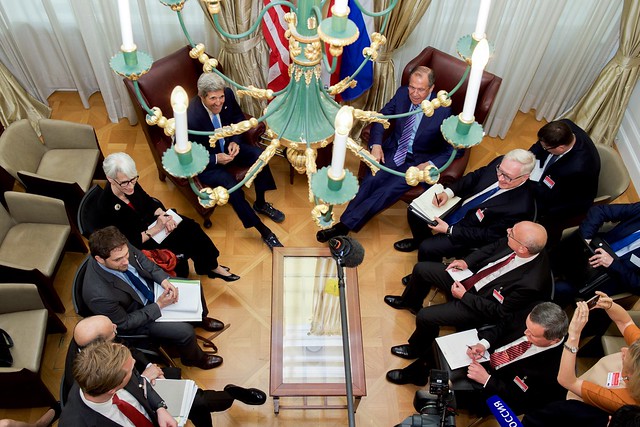
July 1
- Kerry and Zarif met one-on-one, joined later by Salehi, Iranian Deputy Foreign Minister Abbas Araghchi, Deputy Foreign Minister Majid Takht Ravanchi, Moniz, U.S. Undersecretary of State Wendy Sherman, and E.U. deputy foreign policy chief Helga Schmid.
- The IAEA released a report confirming that Iran has complied with its key commitments under the interim nuclear deal.
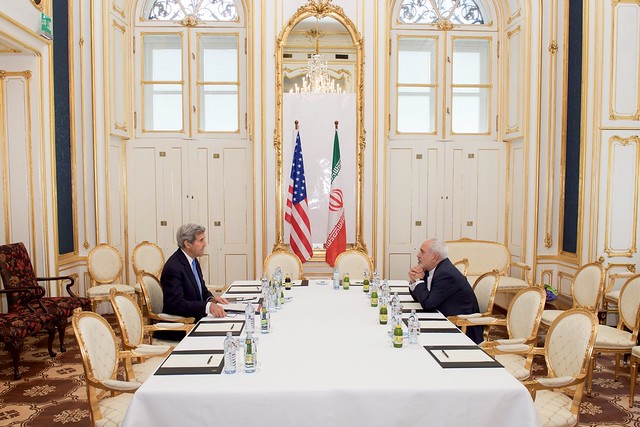
- “We have some very difficult issues,” Kerry said. “But we believe we’re making progress and we’re going to continue to work because of that.”
July 2
- French Foreign Minister Laurent Fabius, Chinese Foreign Minister Wang Yi and British Foreign Secretary Philip Hammond arrived in Vienna.
- Kerry held separate meetings with Zarif, Mogherini, Wang Yi, and Hammond.
- Zarif met separately with Hammond, Steinmeier, and Wang Yi.
- In Tehran, Amano met with President Hassan Rouhani and Secretary of the Supreme National Security Council Ali Shamkhani.
- Salehi and Moniz held another round of talks.
- Iranian deputy foreign ministers Araghchi and Ravanchi met with their U.S. and E.U. counterparts, Sherman and Schmid.
- Ravanchi announced that the foreign ministers would leave Vienna at the end of the day.
Pic: Rouhani and Amano meeting pic.twitter.com/du9lHHWoMU
— Rohollah Faghihi (@FaghihiRohollah) July 2, 2015- “I don’t think we are at any kind of breakthrough yet,” Hammond cautioned. “The work goes on. You’re going to see over the next few days ministers coming and ministers going to maintain the momentum of these discussions.”
- Zarif said, “The negotiations are moving forward and we should be hopeful.”
July 3
- U.S., E.U., and Iranian deputy foreign ministers held a six-hour meeting.
- Kerry met with Zarif.
- Rouhani’s chief of staff Mohammad Nahavandian joined the negotiating team in Vienna.
- Zarif said "We are ready to strike a balanced and good deal and open new horizons to address important common challenges…We have never been closer to a lasting outcome."
All the President's men in #Vienna 2 make the deal, a very positive sign! @HassanRouhani @JZarif #IranTalks pic.twitter.com/iJFFvEI0oy
— Omid Memarian (@Omid_M) July 3, 2015July 4
- Moniz met with Salehi.
- Expert-level negotiators reached a tentative agreement on sanctions relief. But the issue of whether U.N. sanctions should include a “snap back” mechanism if Iran violates the terms of a deal remained unresolved.
- Kerry and Zarif met twice.
- Amano, commenting on his visit to Tehran on July 2, said “With the cooperation from Iran I think we can issue a report by the end of the year on the assessment of the clarification of the issues related to possible military dimensions…We have made progress on the way forward."
First picture from Vienna including Iran president chief of staff Nahavandian. #IranTalks #IranTalksVienna pic.twitter.com/B6Nzndd1L8
— Abas Aslani (@abasinfo) July 4, 2015- Kerry held four separate meetings with Zarif.
- Foreign ministers from Britain, China, France, Germany, and Russia returned to Vienna.
- A senior U.S. official said it was “conceivable” the talks could extend beyond July 7. But Kerry emphasized “We’re currently pushing, as we’ve all said, for the 7th. That’s the deadline.”

July 6
- Foreign ministers from Iran and the world’s six major powers met in Vienna. The foreign ministers met again later in the day, joined by the deputy foreign ministers.
- Zarif held separate meetings with Kerry, Lavrov, and Mogherini.
- IAEA delegates met with officials in Tehran to discuss details of agreements made during Amano’s visit the week before.
Pic: John Kerry at the plenary meeting / photo by Mostafa Ghotbi #irantalksvienna pic.twitter.com/1EozaQHzSe
— Rohollah Faghihi (@FaghihiRohollah) July 6, 2015- Discussions between the foreign ministers became tense. Kerry and Zarif were heard shouting during their one-on-one meeting. In another meeting, Zarif said “If we are talking about regional security, I should take every one of you to international courts for supporting Saddam,” referencing U.S. support for Saddam Hussein’s 1980 invasion of Iran. He also allegedly said "Never try to threaten the Iranians” during a heated exchange with Mogherini.
July 7
- The foreign ministers of Iran and the world’s six major powers were scheduled to meet, but the Iranian delegation never joined the meeting.
- The deputy foreign ministers held a separate meeting.
- Kerry met briefly with Zarif.
- Lavrov, Steinmeier, Hammond, and Fabius left Vienna.
- State Department spokesperson Marie Harf announced that the interim nuclear deal would be extended to July 10. “We’re frankly more concerned about the quality of the deal than we are about the clock,” she said.
- An unnamed Iranian negotiator told the press that one remaining issue was the U.N. arms embargo that bans arms exports to Iran. “Our position is that the arms embargo should not be part” of a final agreement, the official said. Russia also seeks to lift the embargo.
#Araghchi: sanctions-related annex is more than 95-96% completed & just 2,3 small issues yet to resolve. #IranTalks pic.twitter.com/lWK1GKZzel
— Nuclear Talks (@NuclearTalks) July 7, 2015- Araghchi said "The main text of the draft deal is almost complete," but noted that two or three "fundamental and important" issues remained to be resolved.
- President Obama told Senate Democrats he believed there was less than a 50-50 chance of getting a deal.
- Sherman and Robert Malley, an advisor to President Obama, met with Araghchi and Ravanchi.
- Zarif met with Mogherini and Wang Yi.
- Salehi met with Moniz.
- President Obama held a teleconference with the U.S. negotiating team.
- Steinmeier and Hammond returned to Vienna in the evening.
- Schmid met with Araghchi and Ravanchi, with discussions lasting until 1:00am.
White House publishes the pic of last night’s Obama, his NS team-Kerry secure video conference on #IranTalks. pic.twitter.com/YcHxxirDJI
— Bahman Kalbasi (@BahmanKalbasi) July 9, 2015
- Fabius returned to Vienna.
- Schmid met again with Araghchi and Ravanchi. Araghchi later met with Sherman.
- Kerry met with Mogherini, Fabius, Hammond, and Steinmeier. He also held a separate meeting with Zarif.
- Zarif met with Steinmeier.
- Moniz met with Salehi.
- Steinmeier left Vienna, to return the next day.
#Kerry: All that we focused on is the quality of an agrmnt and that is what will continue to define our work. pic.twitter.com/Akkcg0NCYD
— Nuclear Talks (@NuclearTalks) July 9, 2015- In remarks to the press, Kerry emphasized that the talks are "not open-ended," but offered few clues about how long the talks would continue. "President Obama made it very clear to me last night we can’t wait forever for the decisions to be made," he said. "If the tough decisions don’t get made, we are absolutely prepared to call an end to this process."
- Hammond and Fabius left Vienna.
- Zarif met with Steinmeier, Mogherini, and Kerry before a larger meeting with the foreign ministers and deputy foreign ministers.
- Western diplomats told the press that talks would last a few more days. U.S. and E.U. sanctions relief under the interim deal was extended until July 13.
#Zarif on the balcony asked deal is possible today, replied: I guess not. U r here till Monday? I hope not.#IranTalks pic.twitter.com/n5K1roPZxe
— Nuclear Talks (@NuclearTalks) July 10, 2015
- Hammond said negotiators were making progress, but described it as "painfully slow."
- But Salehi said “there is a high chance for agreement in the Austrian capital.”
July 11
- Fabius returned to Vienna.
- Araghchi and Ravanchi met with Schmid, Sherman, and Malley.
- Kerry met with Steinmeier, and met separately with Mogherini and Zarif. He held a third meeting with Mogherini, Fabius, and Steinmeier.
- Kerry spoke with Lavrov on the phone.
- Kerry and Zarif met again later in the evening.
Almost done? #IranTalks pic.twitter.com/nnwjSLeDQG
— Negar نگار (@NegarMortazavi) July 12, 2015- Rouhani claimed that Iran had managed to "charm the world' throughout 22 months of negotiations.
July 12
- Meetings continued at the expert and deputy minister level. Araghchi and Ravanchi met with Sherman and Malley, and Amano and Salehi held a short meeting. The Iranian deputy foreign ministers also reportedly held a meeting with Schmid that lasted until 4:00am.
- Kerry met with Zarif. Kerry said he was “hopeful” after a “very good meeting.”
- Hammond left Vienna.
- Lavrov returned to Vienna in the evening.
- Kerry, Fabius, Steinmeier, Mogherini, Lavrov, the U.K. political director, and the Chinese U.N. envoy held a working dinner.
Zarif on balcony with agreement :) @omidvahabzadeh #IranTalks pic.twitter.com/ak7pLf5pxX
— Negar نگار (@NegarMortazavi) July 12, 2015
- "I think we're getting to some real decisions," Kerry said. "So I will say, because we have a few tough things to do, I remain hopeful. Hopeful."
- Fabius said, "Now that everything is on the table, the moment has come to decide."
- Araghchi, however, said " I cannot promise that the problems will be resolved tonight or tomorrow night.”
July 13
- Lavrov met with Zarif.
- The U.S. and Iranian negotiating teams met with Mogherini.
- Araghchi and Ravanchi met with Sherman and Malley.
- Kerry met with Zarif, joined by the deputy foreign ministers, Salehi, Moniz, Schmid, Malley, and Fereydoun.
- Wang Yi arrived in Vienna.
- Zarif met with Wang Yi. "We believe that nuclear talks between Iran and the six major world powers should not be extended anymore, but we can carry on work as long as it is needed,” Zarif said during the meeting.
- Kerry, Fabius, Steinmeier, Wang Yi, and Lavrov held a meeting. Hammond was expected to return later in the day.
- Iran and the world’s six major powers were scheduled to hold a plenary session in the evening.
If #IranDeal reached, triumph of diplomacy means we all will have won when we all could have lost. Plain and simple; no spin needed.
— Javad Zarif (@JZarif) July 13, 2015
July 14
- Foreign ministers from Iran and the world's six major powers announced that they had reached a final nuclear agreement. Click here for the full text.
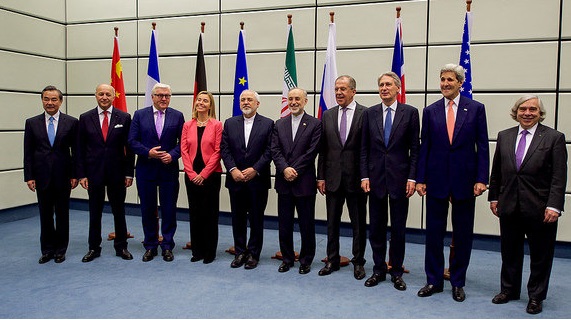
July 20
- The U.N. Security Council unanimously adopted resolution 2231 endorsing the final deal.
- The deal and its annexes were also delivered to the U.S. Congress, beginning a 60-day review period.
Photo credits: U.S. negotiating team, Kerry and Amano, Kerry and Lavrov, Kerry and Zarif, Kerry and reporters, foreign ministers by U.S. Dept of State via Flickr Commons, U.S. Government work
